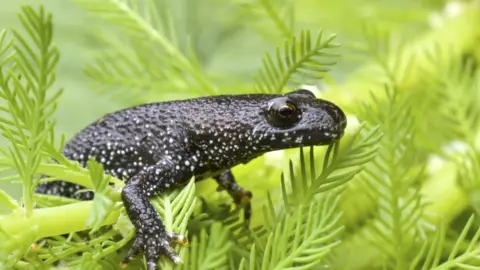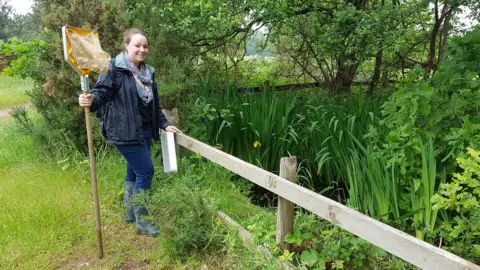Bedfordshire creates 'first ever Newt Officer'
 Science Photo Library
Science Photo LibraryThe country's "first ever Newt Officer" has been created, to help protect and conserve the amphibian, whose numbers are in decline.
Indea Chawk, from Barton-le-Clay in Bedfordshire, will be based at Central Bedfordshire Council.
She will work across Bedfordshire, Oxfordshire and Buckinghamshire to ensure developers help preserve the protected species, said the council.
It is hoped the job will be rolled out nationwide over the next few years.
Ms Chawk, who is employed by the company NatureSpace, will be working with conservationists and Aylesbury Vale, Bedford Borough, Central Bedfordshire, Milton Keynes, Oxford City, South Oxfordshire and Vale of the White Horse district councils, on a Great Crested Newt District License.
Councillor Nigel Young, executive member for regeneration at Central Bedfordshire Council, said: "It's great that we have the first ever Newt Officer based alongside our officers, to help developers and builders meet their legal obligations to this important species of wildlife."
 Central Bedfordshire Council
Central Bedfordshire Council "If a proposed development is within 500m (0.31 miles) of a pond, great crested newts become a consideration for planning applications.
"That's where the newt officer steps in," a spokeswoman for Central Bedfordshire Council said.
The licence means developers need to get a certificate from the newt officer when submitting a planning application.
They then pay a proportionate fee to compensate for the impact of development on the newts.
"The money will go towards creating new aquatic and land habitats for newts in locations across the region," the council said.
Indea Chawk is "loving every minute of her new job" and "knew it was perfect" for her.

Great Crested Newts
- Are the biggest newt species in the UK and have been around for approximately 40 million years
- During the breeding season males develop a jagged crest which has a break at the base of the tail and females take on a "bulky" appearance
- Adults grow up to 15cm (6in) in length
- Their skin is black or dark brown with a rough, warty appearance and their underside is bright orange with irregular black blotches
- Populations have disappeared from many sites across Europe due to habitat loss and intensification of farming practices
Source: Froglife

